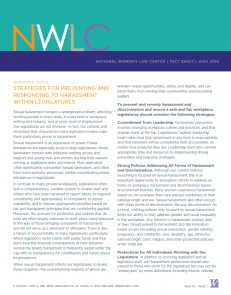 Sexual harassment remains a widespread problem, affecting working people in every state, in every kind of workplace setting and industry, and at every level of employment. Our legislatures are not immune—in fact, the cultures and structures that characterize many legislative bodies make them particularly prone to harassment.
Sexual harassment remains a widespread problem, affecting working people in every state, in every kind of workplace setting and industry, and at every level of employment. Our legislatures are not immune—in fact, the cultures and structures that characterize many legislative bodies make them particularly prone to harassment.
Sexual harassment is an expression of power. Power imbalances are especially acute in state legislatures, where lawmakers interact with lobbyists seeking access and support and young men and women starting their careers serving as legislative aides and interns. Male lawmakers often significantly outnumber female lawmakers, and often have more seniority and power, further exacerbating power imbalances in legislatures.
In contrast to many private workplaces, legislatures often lack a comprehensive, credible system to enable staff and others who have been harassed to report safely; to respond consistently and appropriately to complaints; to assess culpability; and to impose appropriate penalties based on fair and transparent principles that are consistently applied. Moreover, the avenues for protection and redress that do exist are often largely unknown to staff, place many obstacles in the way of those bringing complaints of harassment, and do not serve as a deterrent to offenders. There is also a failure of accountability in many legislatures, particularly where legislators settle claims with public funds and thus don’t bear the financial consequences of their behavior. Across the board, harassment is frequently swept under the rug with no transparency for constituents and voters about its prevalence.
When sexual harassment infects our legislatures, it denies those targeted—the overwhelming majority of whom are women—equal opportunities, safety, and dignity, and can block them from serving their communities and becoming leaders.
